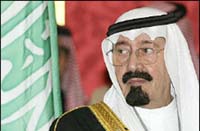Britain's Brown meets with Abdullah

British Prime Minister Gordon Brown and King Abdullah met on Wednesday to discuss Iranian nuclear program, terrorism and the Middle East peace talks.
Brown described Saudi Arabia as an important partner and ally in the Middle East in an interview published Wednesday in the London-based Saudi-owned newspaper Asharq Al-Awsat.
Abdullah's 2002 Arab Peace Initiative, which calls on Arab countries to make peace if Israel withdraws from the Palestinian territories, is an important framework going into a U.S.-sponsored peace conference, Brown said.
No date has been set, but Brown said Saudi participation was crucial at the peace conference, expected to take place in Annapolis, Maryland.
"The Saudis have done more than many over recent years to get us to where we are today," Brown was quoted as saying. "We see an engaged Saudi role as key to helping bring about the success of this."
At a banquet hosted by Queen Elizabeth II at Buckingham Palace on Tuesday, the king suggested that the peace talks were a priority for him as well.
"I am confident we will find from the government of your majesty every help to end the tragedy suffered by our Palestinian brethren through genuine peace that can protect the rights of all parties," Abdullah said in remarks translated from Arabic.
In the newspaper interview, Brown said the international community needed Saudi support in its efforts to prevent Iran from obtaining a nuclear weapon - a development that would threaten regional stability.
"Saudi engagement on the Iranian nuclear issue is critically important," Brown was quoted as saying.
Before arriving Monday for the first state visit by a Saudi king in two decades, Abdullah criticized Britain for not doing enough to fight terrorism.
Abdullah, 83, who is also the Saudi prime minister, accused Britain of failing to act on intelligence that might have prevented the 2005 London transit bombings, in which four suicide bombers killed 52 people. British officials insist they would have acted on such information had it existed.
Analysts said the king's comments appeared to be aimed at distancing himself from the extremists and at the same time pre-empt attacks on Saudi Arabia's record of fighting terrorism.
The countries' relationship has attracted controversy after the British government halted an investigation in December into whether a Saudi prince received kickbacks in a 43 billion-pound (EUR62 billion; US$87 billion) arms deal with a British weapons manufacturer.
Then-Prime Minister Tony Blair said the probe would jeopardize Saudi cooperation in fighting terrorism and cost Britain jobs. U.S. officials have since opened their own investigation.
Saudi Arabia, however, also faces charges of spreading ideas that fuel extremism and terrorism.
The Saudi royal family's legitimacy depends on an extreme version of Islam known as Wahhabism. The Saudi royals face the delicate task of maintaining the approval of some of the same clerics who inspire al-Qaida-oriented terrorists.
The lavish hospitality shown to Abdullah has drawn protests from critics who say the oil-rich kingdom should be condemned for alleged human rights abuses.
Saudi Arabia, the world's leading oil producer, is an absolute monarchy where citizens are expected to follow a strict interpretation of Islam. Women face severe discrimination, many prisoners are tortured and those convicted of murder, drug trafficking, rape or armed robbery are beheaded.
Vince Cable, acting leader of the opposition Liberal Democrats, boycotted the visit and backbench lawmakers from Brown's Labour party planned a human rights protest outside the Saudi embassy later Wednesday.
"It is not just that the Saudis have a terrible record on human rights at home," Clare Short, who resigned as international development secretary following the U.S.-led Iraq invasion in 2003, was quoted as saying in the Independent.
"They are exporting an extreme fundamentalist form of Islam. We should not be giving a state visit to this regime," she said.
As well as talks with Brown, Abdullah will meet opposition Conservative leader David Cameron and then separately with Prince Charles later Wednesday. The king leaves Britain on Thursday.
Subscribe to Pravda.Ru Telegram channel, Facebook, RSS!


